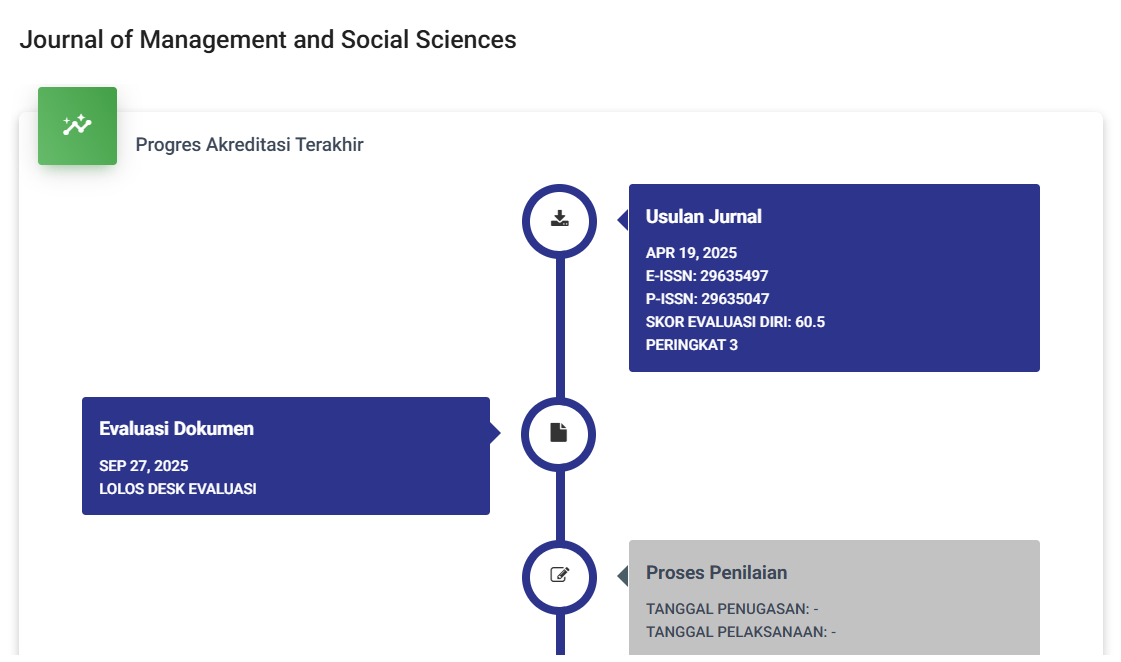Analisis Budaya Organisasi Menggunakan Organizational Culture Assessment Instrument (OCAI) pada Karyawan PT Eddy Transport Raya
DOI:
https://doi.org/10.55606/jimas.v1i4.101Keywords:
organizational culture, OCAI, performance, leaderAbstract
This study aims to describe the current and preferred organizational culture profile of PT Eddy Transport Raya based on the perceptions of all employees. The sampling method in this study is included in the type of saturated sample, where all the population numbers are samples. The total population in this study was 33 consisting of all employees of PT Eddy Transport Raya, so there were 33 people to be used as samples for research data collection. Primary data collection was carried out by distributing OCAI (Organizational Culture Assessment Instrument) questionnaires to all employees. The variable in this study is organizational culture with 4 indicators indicator or type of culture namely Clan, Adhocracy, Market and Hierarchy. The results of these 4 indicators provide an understanding of the organizational culture of the company. Thus it can help leaders in terms of communication and decision making within the company. In this study, employees have the perception that the current organizational culture of PT Eddy Transport Raya is more towards clan culture. In addition, employees have the desire to change and improve the organizational culture to become adhocracy.
References
R. Bamidele, “Organizational Culture,” in Industrial Sociology, Industrial Relations and Human Resource Management, 2022, pp. 284–292.
Luthans, “Organizational Behavior : An Evidence-Based Approach. New York:McGraw-Hill.,” 2013.
Robbins, “Perilaku Organisasi. Jakarta: Salemba Empat.,” 2012.
L. I. Tianya, “Organizational Culture & Employee Behavior: Case study,” Lathi University of Applied Sciences, 2015.
K. S. Cameron and R. E. Quinn, Diagnosing and Changing Organizational Culture: Based on the Competing Values Framework. Massachusetts: Addison-Wesley, 1999.
Quinn, “Diagnosing and Changin Organizational Culture : Based on the Competing Values Framework, Third Edition (San Fransisco : Joh Wiley & Sons, Inc),” 2011.
Wibowo, “Manajemen Kinerja (Edisi 4). Jakarta: PT. Rajagrafindo Persada.,” 2017.
Kusdi, “Budaya Organisasi Teori, Penelitian, dan Praktik. Jakarta: Salemba Empat.,” 2013.
E. Sutrisno, Manajemen Sumber Daya Manusia. Jakarta: Kencan Predana Media Group, 2014.
Thoha, “Perilaku Organisasi Konsep Dasar dan Aplikasinya. Jakarta: Raja Grafindo Persada,” 2014.
B. B. Frey, The SAGE Encyclopedia of Educational Research, Measurement, and Evaluation. 2455 Teller Road, Thousand Oaks, California 91320 : SAGE Publications, Inc., 2018. doi: 10.4135/9781506326139.
B. F. Rendita, A. L. Kadiyono, and A. Rezki, “Analisis Budaya Organisasi Menggunakan Organizational Culture Asessment Instrument (Ocai) Pada Pt. X,” MUKADIMAH: Jurnal Pendidikan, Sejarah, dan Ilmu-ilmu Sosial, vol. 5, no. 1, pp. 63–69, 2021.
I. Wellem, “Analisis Budaya Organisasi dengan Menggunakan Metode Organizational Culture Assessment Instrument (OCAI) pada Perusahaan Daerah Air Minum (PDAM) Kabupaten Sikka,” Jurnal Projemen UNIPA Maumere, vol. 6, no. 1, pp. 1–22, 2019.
UT Tyler, “Organizational Culture Assessment Instrument - sample report,” Texas, 2019. [Online]. Available: www.ocai-online.com








